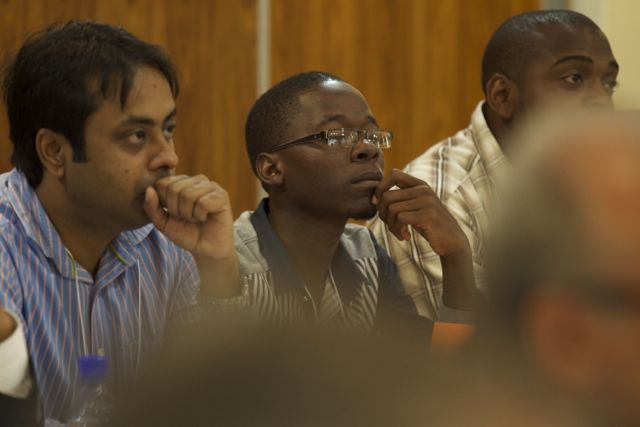
VentureWell’s Xcelerator Training Program provides strategic planning tools for participants to work with through structured guidance over the course of three days. More often than not, participants find additional applications for the tools they begin to use at Xcelerator beyond marketing their current innovation. For Dr. Amy Webb-Girard, Xcelerator transformed her vision of the knowledge her students in public heath and nutrition need in order to have a greater impact beyond the university.
An Assistant Professor of Global Health at Emory University, Dr. Webb-Girard’s work focuses on the development of innovative social and behavior change strategies to improve food security and maternal and child nutrition in global settings. Along with Dr. John Colton, Professor of Manufacturing at Georgia Tech, she has created a demarcated feeding toolkit, consisting of a plastic bowl with marks to indicate the amount of food necessary to feed newborn to 24-month old children, and additional food needed by pregnant and breastfeeding women. Working across different continents, the team leaders appreciated the opportunity to spend dedicated time at Xcelerator, brainstorming how to move from initial development of the toolkit to large scale organizational buy-in for this new product.
According to Webb-Girard, the process of developing a strategy map and business pitch at Xcelerator was especially useful. “You had to pitch your idea to [workshop participants who were acting as] investors… It really forced us to get up and do it. You can talk about this in theory – here are the elements – but to do it in front of 15 people … that was what was so useful about strategy mapping.” Going through the steps with other participants, under the tutelage of workshop leaders, gave her team “the space and the critical engagement with people who are not imbedded in [the] project and invested in it to be critical and open to say, ‘That’s too small, think bigger’ or, ‘That’s too big, think smaller.’” The advice they received allowed them to focus and strategize.
Through Xcelerator, Webb-Girard developed a newfound “business savvy that allows me to know when to approach people and how to talk with them.” In her opinion, the workshop made her “more aware of the nuances of end users and the influential conversations or marketing technology we need to think about, and how to fragment it and stratify our approach depending on who our end user is.” Webb-Girard explains that, “This really was the first time I’ve been introduced to a lot of [these] concepts… [In graduate school], we learn about nutrition and how the body works, but you have limited training in how to initiate and sustain social and innovative change around positive dietary practices… This workshop was critical in learning that.”
By exposing her to strategic planning and marketing techniques, Xcelerator transformed Webb-Girard’s perspective on her curriculum at Emory. “Being a teacher, I see a lot of lessons from this workshop that I’m going to integrate into my coursework…” The conceptual building blocks and hands-on learning approach of the Xcelerator workshop have direct applications in her program. “There’s a lot around how to reach early adopters and using them. The diffusion of innovation curve would be useful to integrate into our Fundamentals of Global Health course, which is our foundations course. The concept of strategy mapping for program development, and a lot around branding and developing value proportions, and getting our students to think more like marketers and … how to identify and mitigate risks in your programs will be useful. Because that’s not something we do a lot with.”
In the coming year, Webb-Girard expects to continue building on the workshop by connecting with and learning from her Emory colleagues in business and entrepreneurship. She will likely challenge her students to go through any number of Xcelerator exercises, perhaps picking one of her favorites, which involves identifying “the risks that will kill your program and how you keep that from happening, working your way backwards to mitigate this so it never happens – or if it does happen you have recourse, an identified back-up plan.” As demonstrated so amply through her Xcelerator experience, this type of hands-on problem solving is the best way to open minds and prepare young academics to move into the broader world of global change. As she describes Xcelerator, “The act of doing is the art of learning.”